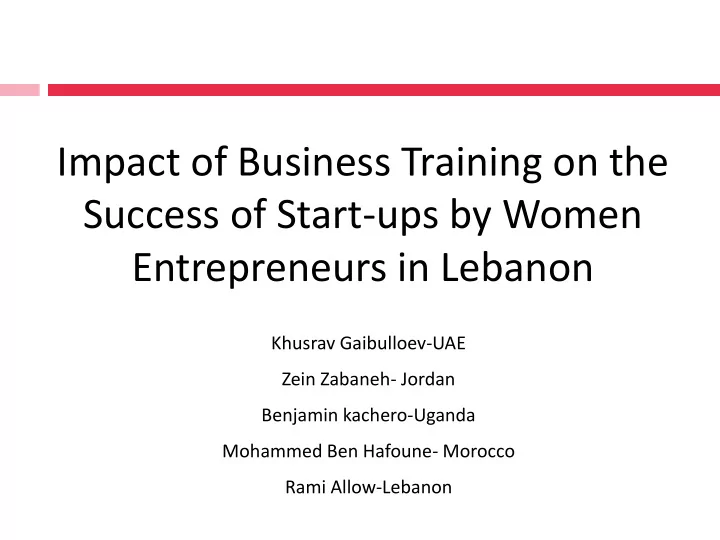

Impact of Business Training on the Success of Start-ups by Women Entrepreneurs in Lebanon Khusrav Gaibulloev-UAE Zein Zabaneh- Jordan Benjamin kachero-Uganda Mohammed Ben Hafoune- Morocco Rami Allow-Lebanon
Background • In Lebanon, Micro Finance Institutions (MFIs) serve primarily low-income urban and rural individuals and small businesses. They offer loans of US$500 – US$5,000 to both individuals and groups. Most clients operate small businesses from home or registered locations with few or no employees. • Based on a survey, 70% youth women entrepreneurs demonstrated need for business skills training to leverage their business loans as their business survivability and growth is often not successful. Only 10% of respondents have proper business knowledge.
Background • Traditional financial institutions (banks and MFIs) are conservative in lending individual women-run start-ups. • Women have difficulty starting or growing businesses due to lack of business knowledge and financial management.
Theory of change 70% women entrepreneurs demonstrated need for Need Assessment business skills training to leverage their business loans Provide business skills training to women Intervention entrepreneurs receiving loans The expected number of businesses who continue operating without training is 50%. Assumptions Take-up rate of training is 70%. Women will use the knowledge they gain in running their businesses. 1) Better knowledge of running a business (e.g., Intermediary business management and planning) outcomes 2) Increased income after 1.5 years After 1.5 year, training will increase business Outcomes survivability from current 50% to 70% and those who received training will earn 10% more profit. 4
Evaluation Questions and Outcomes Our evaluation focuses on measuring the impact of business training on the success of startups by women entrepreneurs in Lebanon. Research questions: • Will providing business skills training to women improve their business survivability? • Will business training improve profitability of women start-ups businesses? Research Hypothesis to be measured: Women run businesses that are taking the training are expected to be operating by the end of the program (after 1.5 years) and have higher profit than the those not taking the training.
Evaluation Design • Design : cluster randomized trial (due to spillover). Neighborhoods are used as clusters (unit of randomization), which are randomly assigned into treatment or control group. Women-entrepreneurs are randomly drawn from each cluster. • Encouragement design is used • Power calculation : we assume alpha=0.05, power=80%, n=20; standardized effect size = 25% (based on outcome of earning 10% higher profit); rho = 0.05. We compute the number of clusters (J) = 52 . We expect 70% take-up rate, so we need J = 104 . (If we change rho=0.10, then J=150). • We have a sample of 2080 women entrepreneurs divided equally into control & treatment groups • Note: To measure spillover, need larger J.
Data Data requirements Method/Source Data on social demographic, characteristics of young Microfinance database female entrepreneurs and baseline interview Baseline interview Data on the economic and infrastructure situation in the communities where the group members live. Data on other factors such as the legal system, taxes, National Statistics tariff and non-tariff barriers that might be responsible Authority of Lebanon for business performance Randomization/ Baseline Data on whether an entrepreneur has received interview training Follow up on business performance (years in business End line survey and profitability) Data on the loan application and repayment trend Microfinance database
Potential Challenges • Some women in treatment group may trade and exchange information with those in the control group • Those in control group may choose to attend another training program elsewhere outside the intervention • Some who received training actually end up not setting up the business • Some in the control and treatment groups may not be reachable at end-line due to change of location (attrition) • Some in the treatment group may not attend the training (partial compliance)
Managing Challenges • Cluster randomization: to account for spillover within the treatment region • Encouragement component to 1) encourage those assigned for the treatment group to take up the training (marketing activities) and, 2) to open or run their businesses (for both control and treatment groups) • We assume that those who are not reachable will be equal in both control and treatment groups
Results Results would: • Benefit the women in increasing their participation in the local economy (through higher earnings). • Provide evidence for policy makers for decision making that encourages women entrepreneurs • Enable MFIs to expand their product and services offering to women entrepreneurs Dissemination of results • National and international workshops/conferences/webinars • Policy briefs • Media i.e newspapers and talk shows
Thank You
Recommend
More recommend